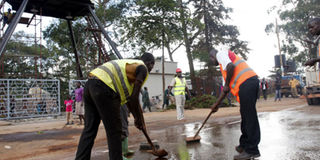Pope’s visit and the election campaigns

A road in Kampala being repaired ahead of the Pope’s visit. PHOTO BY RACHEL MABALA
Two days before the Pope arrived in Uganda, workers were putting last-minute touches to Kampala city.
Going about Kampala, it was sad having to watch what we have come to. Half the street lights on the Nsambya-Ggaba road working and half are not.
On the road leading up to Mbuya from Nakawa where the papal entourage was expected to drive, tarmac was hastily added at the margins of the road to widen it.
It would seem that we have no notion of our value.
We tidy up and clean our homes and business premises when we expect visitors but are comfortable with them looking shabby all-year round when it is us occupying them.
These little details reflect just who the people called Ugandans are. Some like me decided years ago that we are unable to salvage ourselves.
The laxity and lack of seriousness that runs through nearly everything that is Uganda and Ugandan indicates, among other things, that for capitalism and the free market to work it requires something much more than simply opening up the economy to the private sector.
It requires an educated, serious, dedicated workforce to drive the details of the market.
We are unable to create a modern nation-state because we do not have the attitude and with it the skill to do so.
Looking at the quality of Ugandan radio and TV stations, banks, hotels, health clubs, newspapers, supermarkets, restaurants, schools, transporters, hospitals, retail shops and so on, it is difficult to believe that these business entities are really in a competitive market or are even competing.
When the pressure starts to build up on them, what most Ugandan companies do is not improve their quality and productivity, but to make frantic calls and contact with regulatory authorities, government officials and key staff in business companies to help bend the rules for them, turn a blind eye to their taxes and obligations and go past the budding process to give them contracts.
Competition tends to wear out rather than fire up the spirit and morale of the Ugandan manager and his or her staff.
Resentment creeps in. Any critique of their businesses by the media is treated as “hate” or a case of a rival having paid the media company to tarnish their business.
Incidentally, this is one reason why business journalism and reporting have almost failed to gain traction in Uganda. There is not enough business data, earnings reports and objective analysis of the market and business enterprises as there is, say, in Europe and America because of the social climate in the country.
The media is also afraid to give businesses a factual and objective treatment because, of course, it is desperately dependent on corporate and other business advertising to fund its operations.
If the cliché is that “the customer is king”, in Uganda the advertiser is emperor. The media is beholden to the business community.
As said at the start of the column, it is sad having to watch what Uganda has come down to.
I personally don’t think there is much of a future for Uganda. This incompetence will keep building up. For a time we shall get away with it and even seem to be expanding economically.
But eventually, it will all come to a peak. We are already seeing this from the fact that an economy that for 20 years from 1972 to 1992 had been put into the hands of Ugandans started to return to foreign hands.
Today, almost all major infrastructure projects are being built by the Chinese.
Without European Union funding of key sectors in Uganda, the true crisis and degree of state collapse that is disguised by foreign-funded projects would be laid bare.
More on that another week.
Update on the election campaigns
Let’s return to the presidential election campaigns.
One of the presidential candidates, Amama Mbabazi, had complained to the Electoral Commission over the way the pro-Museveni NRM faction was deliberately disrupting his countrywide campaigns.
The NRM secretary general, Justine Kasule Lumumba, apologised last week to Mbabazi over the conduct of the NRM camp.
That was something not many people expected. We are accustomed to the NRM being an unapologetic party, portraying itself as always right in everything and the fault always with its opponents and critics.
Some saw this apology by the NRM as a sign that at last Ugandan politics under the NRM is starting to become civil. Others saw this as yet another bit of evidence of the unexplained political clout Mbabazi is supposed to have.
Three-horse race
It is now clear that what we have ahead of 2016 is a firmly established three-horse presidential race between the incumbent Yoweri Museveni and two others, FDC flag bearer and three-time runner-up Dr Kizza Besigye and Mbabazi.
There is a widespread perception that the election could be rigged or at the very best there are going to be concerted efforts to rig it.
Once rigged, as the perception goes, the reaction by Besigye and his supporters will be the familiar one; they will reject the results and appeal to the public’s sense of outrage to rally around them.
In light of this, the question on many analysts’ minds is what Mbabazi will do.
That is why the NRM’s apology to him requires us to watch that space closely.
www.twitter.com/timkalyegira
Facebook: Kampala Express




